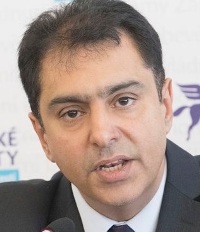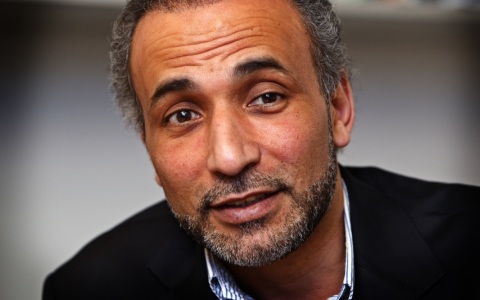NEWS FOCUS: Quilliam bids for US credibility under its new CEO
by - 5th October 2016
 THE new CEO of the world’s first Islamic counter-terrorism think tank wants to go global and ‘reclaim the middle ground’ in the US debate over Islam.
THE new CEO of the world’s first Islamic counter-terrorism think tank wants to go global and ‘reclaim the middle ground’ in the US debate over Islam.
Haras Rafiq, who joined Quilliam as a volunteer two years ago, plans to establish a North American division as the organisation broadens its work beyond the UK.
‘The debate in the US has become polarised. Because there hasn't been leadership from the top naming the problem and differentiating it from the faith - Islamism vs Islam, a political ideology versus a faith that’s practised differently by many different people - we’ve got the likes of Donald Trump,’ Rafiq told Lapido in an interview following news of his appointment in September.
Alongside financially sustainable growth for Quilliam, Rafiq wants ‘penetration on an international level’. The think tank has built a network of eighty to a hundred Muslim organisations operating in Europe and has similar efforts in north Africa and the Middle East.
Criticism
Rafiq acknowledged that Quilliam has not always met with approval in the UK. ‘The far right hates us, the regressive left hates us, and there are some people within Muslim communities that don't like us as well.’
Certain events in the organisation's history have brought it under scrutiny, from work with English Defence League founders Tommy Robinson and Kevin Carroll; to the much criticised, leaked list for the government's Prevent counter-terrorism strategy in 2010, in which Quilliam claimed a number of UK Muslim organisations had extremist sympathies.
Some criticism goes back to its foundation by three former members of Hizb-ut-Tahrir, one of whom was imprisoned in Egypt for being a member of an outlawed Islamist organisation.
For Dr Sean Oliver-Dee, author of The Caliphate Question and Research Fellow at the Centre for the Study of Religion in Public Life at Oxford University, criticism is inherent in the way Islam works.
‘They aren't well-regarded within Muslim communities. There's nothing they can do about it in so far as there are Muslims who will say that any Muslim that works with a Western government is working against Muslims,’ he said.
Quilliam worked with both Labour and Conservative governments on its counter-extremism strategy, Prevent, which Rafiq helped construct and launch in 2005-6.
But in 2011 Quilliam ended any public funding and is now financed by private donations from Muslims and non-Muslims, a shift which its Head of Policy, Jonathan Russell, has described as advantageous in maintaining a non-partisan status.
Beyond facing ‘the preventing Prevent lobby’, Rafiq said he is addressing insufficient outreach within Muslim communities by Quilliam. Recent appointments such as Turkish-background former al-Muhajiroun member Adam Deen, now Quilliam's managing director, and Dr Salah al-Ansari, former imam at London’s prestigious Central Mosque in Regents’ Park, show that attitudes towards the organisation are changing.
For Oliver-Dee, aspects of Quilliam's work are rooted in the philosophical rather than the theological, problematic for those Muslims, who see arguments on philosophical grounds as less ‘pure’ in terms of faith. ‘The Muslim world, depending on how you define that, is really in a state of competing narratives, the question being: which narrative wins out in the end?’ he said.
Credibility
A recent debate between Rafiq and Tariq Ramadan, Professor of Contemporary Islamic Studies at Oxford University, is indicative of this competition, said Oliver-Dee. Ramadan's anti-Prevent stance could position his organisation as the new go-to group on counter-extremism for the government, he added.

Writing in the Guardian, Ramadan, whose father established the Muslim Brotherhood in Europe, declared the Prevent strategy a failure. While not naming Quilliam, he singled out ‘organisations (...) which the government collaborates with or finances’ for lacking ‘the street credibility’ to counter extremism at a grassroots level.
For Rafiq, Ramadan's article exemplifies the ‘preventing Prevent’ movement that ‘focuses on fearmongering, inaccuracies and untruths’.
‘Prevent is not perfect, but it’s the strategy that’s learnt from its mistakes and is still learning. It’s the best strategy that is out there internationally right now,’ he said.
Arguments
In a rebuttal on Quilliam's website, Rafiq said Ramadan and others' criticism stems from ‘failure to fully exploit the post 9/11 counter-extremism agenda for their own advantage’.
He questioned Ramadan's ‘uncritical’ relationship with the Muslim Brotherhood, whose founder Hassan al-Banna is his grandfather. Professor Ramadan did not respond to a request from Lapido for comment.
Yet, when discussing his new role, Rafiq shifted focus from individuals and personal agendas.
‘It shouldn't be about who is at the helm of the ship, it should be about what the organisation is representing. I think that sometimes when people focus on personalities it's because they don't have the ammunition to deal with the arguments,’ he said.
Rafiq is keen to hire and retain staff who can add value to society as well as to Quilliam.
‘Pluralism is very important to me, because that's what there is outside of Quilliam and that’s what we want in terms of shaping the debate.’
For Quilliam co-founder Maajid Nawaz, now executive board member, this value comes from a move into more mainstream media. He has just announced he will be presenting a new weekend radio show with broadcaster LBC, and stood as Liberal Democrat candidate for Hampstead and Kilburn in the 2015 election.
While he agrees that Rafiq's personality will not make a vast difference to public perception of Quilliam, Oliver-Dee is ‘cautiously welcoming’ of what the foundation is currently saying.
‘They seem more open to the fact that there are theological and scriptural issues that need rigorous interpretation to counter radicalisation.
‘I have a sense of an organisation that's genuinely searching for answers,’ he said.
NEED TO KNOW Haras Rafiq and Britain’s Sufis
BRITISH-BORN Pakistani Haras Rafiq joined Quilliam Foundation in 2007 as a volunteer. He later became head of outreach, then managing director before his appointment as CEO in September 2016. He is also a member of the foundation's executive board.
Part of the Advisory Group on Online Terrorist Propaganda at the European Counter Terrorism Centre (ECTC), he was formerly a member of the UK government's task force, which looked at countering extremism in the wake of the 2005 London bombings.
He regularly appears in the press and on TV to discuss counter-extremism and related issues, and earlier this year spoke strongly against the religious glorification of the death of Mumtaz Qadri, executed for murdering Pakistani politician Salman Taseer in the name of blasphemy.
Rafiq co-founded the Sufi Muslim Council (SMC) in 2006 with the backing of Mohammed Sarwar, a Sufi Muslim and Britain’s first Muslim MP, who later became Governor of the Punjab in Pakistan, just two years after Taseer’s assassination. The SMC was intended to provide a strong voice for the ‘silent majority’ of Sufi Muslims in the UK. Its mission was to develop a field of moderate thinkers, scholars and values based on classical Islam. At its launch, Rafiq said the organisation would fill a ‘vacuum’ with regards to countering extremism within Muslim communities in the UK.
According to journalist and author Innes Bowen in her book Medina in Birmingham, Najaf in Brent: Inside British Islam, the SMC ‘adopted a far more confrontational approach’ with non-Sufi groups than its contemporary the British Muslim Forum.[1] Both organizations had been established in part to address concerns that the Muslim Council of Britain (MCB) was seen as representative of all UK Muslims, when in fact it was founded at the urging of government from 1995, and is now dominated by the Deobandis who spawned the Taleban.
SMC’s launch was attended by then Secretary of State for Communities and Local Government Ruth Kelly and Attorney General Dominic Grieve. The SMC claim, which is contested, is that as many as eighty percent – two million - of Britain’s Muslims are Sufi, follow a sheikh, venerate the Prophet Muhammad, as well as other saints and shrines and practise a devotional and experiential Islam that is anathema to the hard-line Saudi strain of Islam. Rafiq himself follows a Lebanese sheikh Hisham Kabbani, based in the US, whose deputy, Sheikh Nazim, believes Prince Charles is a descendant of the Prophet Muhammad.
The movement was dismissed at its launch by the MCB as ‘unrepresentative and divisive’, indicating a tendency described by Philip Lewis: ‘So long as institution-building continues to be dominated by those born elsewhere, sectarian disputes within those countries will be kept alive in Britain.’
The belief among the British élite can be caricatured as ‘Sufi good, Islamist bad’, with the Sufis being associated with the mystical poetry of Rumi, and with a spirituality with which Britain can do business. Lewis however points to commentators within Islam who believe this is short-sighted: ‘. . . they often led military movements against colonialism in the nineteenth century.’[2]
Indeed, political Islam itself emerged out of a radical critique of Sufi institutions deemed by activists to be accretions, and to have compromised Islam, consigning the rural poor in India and Egypt in the 1920s and 30s to their fate.
Alternative research into the council, including Simon Stjernholm's 2010 article, suggests it has had some success in bringing several significant Sufi communities together through a series of public events, and that it has taken a courageous stand against radicalising tendencies in other strains of Islam in Britain and elsewhere.
Bowen concludes – significantly in light of Quilliam’s avowed aim to tackle the seedbed of terror: ‘The Sufis may have won the fight to counter the influence of the Salafis. But when it comes to the bigger battle for Muslim hearts and minds – that against the Deobandis – the Sufis still have a long way to go.’
